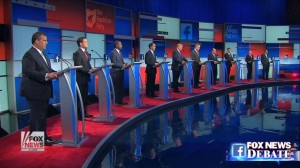God’s Own Party: Analyzing the GOP Debates
 Screengrab via Fox News
Screengrab via Fox News Every four years, the world pauses to watch one of the most entertaining events broadcast on television. The contrived drama, the heated rivalries, and the very real concerns regarding the influence of money all add to the tension and excitement of this rare event. As much as sounds like it, this event isn’t the World Cup—it’s the presidential primary debates.
The first Republican primary debate, hosted by Fox News, was just as bad as you would expect, with the exception of several surprising questions that were actually relevant and hard-hitting and several answers by the candidates that were reasonable and at least tangentially aligned with humanistic values.
Popular Fox journalist Megyn Kelly managed to throw in some unforgiving questions in-between the intellectual softballs that are lobbed in all debates, including in past Democratic primary debates. While she started by going after The Donald, criticizing disparaging and sexist remarks he made on his social media accounts about women he didn’t like, her best moment was when she asked several of the candidates if they would support abortions in cases of rape or incest. Not only was this a hard-hitting question which forced candidates to make their views on a relatively uncomfortable subject known, it was asked at a time when abortion and women’s health are hyper-relevant given the manufactured ongoing “crisis” surrounding Planned Parenthood.
Ohio Governor John Kasich should also be praised for being the most compassionate and least crazy person on stage—the award for most crazy went to former governor Mike Huckabee who as a supporter of a constitutional amendment against gay marriage and an opponent of women’s health and secularism is far more dangerous than the human sideshow that is Donald Trump.
When asked how he would explain his opposition to gay marriage to his children if one of them were gay, Kasich replied, “I just went to a wedding of a friend of mine who happens to be gay. Because somebody doesn’t think the way I do, doesn’t mean that I can’t care about them or can’t love them. So if one of my daughters happened to be that, of course I would love them and I would accept them…I think the simple fact of the matter is, and I’ve been saying it all along, we need to give everybody a chance, treat everybody with respect, and let them share in this great American dream that we have, Megyn.” While not exactly an endorsement of equal rights for LGBTQ Americans, Kasich should be commended for being brave enough not to gay-bash as his fellow conservatives have done, both on the debate stage and across the country.
But those few moments were the only ones that didn’t leave humanists across the country pulling their hair in frustration and disbelief. As to be expected, numerous God-bombs were dropped throughout the night, as candidates peppered their policy statements with references to their reliance on the supernatural and religion in general.
In fact, one of the final questions of the night came from a viewer who asked if the candidates had heard from God on what they should do and take care of first. The responses the candidates gave should speak for themselves.
Apparently, Senator Ted Cruz has a very close relationship with God: “I am blessed to receive a word from God every day…” Wisconsin Governor Scott Walker went even further, stating that “I’m certainly an imperfect man. And it’s only by the blood of Jesus Christ that I’ve been redeemed from my sins.” And Senator Marco Rubio insisted that “…God has blessed our country. This country has been extraordinarily blessed. And we have honored that blessing. And that’s why God has continued to bless us.”
The constant references to faith, even when the question being asked wasn’t explicitly religious, showed America that while Republicans may be divided on domestic and foreign policy, they are united on the idea that faith—the Christian faith in particular—is a prerequisite for public office. This pandering to religious right voters may be effective in the primary season, but it will continue to alienate nonbelievers who might support the party and is likely to motivate secular independents to take their votes elsewhere.
Plenty of time remains for the GOP field to narrow and for the remaining candidates to refine their policy positions, but barring some epiphany by Republican strategists, it is extremely unlikely that the God-talk will slow down anytime soon. The practical impact of this language is that the GOP will continue to narrow its base of potential supporters and neglect the many conservative atheists around the country who would likely vote for a Republican for president—if only that Republican didn’t do everything in his or her power to make it clear that he or she doesn’t care about the First Amendment and America’s proud tradition of secularism.
